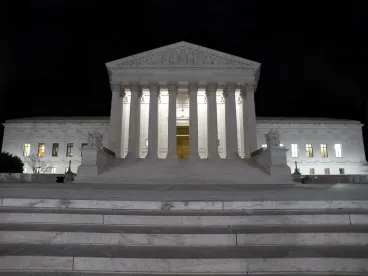Like many who learned Tuesday morning that the Supreme Court had decided to uphold the Trump Administration’s travel ban, I was heartbroken. As one of the many volunteers who met immigrants at the Dulles International Airport days after the ban’s implementation, I wanted to ensure that religious discrimination wouldn’t be tolerated. But Trump v. Hawaii did more than uphold the travel ban.
While news outlets focused largely on the contentious 5-4 Supreme Court ruling upholding the travel ban, there was another issue at play—the legality of national injunctions. This is another potential threat to access to justice with far-reaching implications.
In Trump v. Hawaii, plaintiffs argued the ban on travel to the United States from seven countries–most predominately Muslim–violated federal law forbidding religious discrimination. A federal district court judge in Hawaii agreed and issued a national injunction—forbidding the administration from applying the ban to the parties in his case and others across the country.
In his concurrence, Justice Thomas alone suggested that Hawaii’s federal district court judge was not authorized to issue the national injunction, and in doing so cited my article, Class Actions, Civil Rights, and the National Injunction. He was skeptical that national injunctions were legitimate, a view contrary to my own. I write this piece to highlight some of the important benefits of national injunctions, particularly as a tool for protecting the most vulnerable in our society.
Justice Thomas relies primarily on history and tradition in his conclusion—an approach supported by other scholars. But should the English Court of Chancery in 1789 be used as a barometer for what is allowed by federal courts in the United States in 2018, as set forth in his concurrence? Are we tethered to follow lock step a British system from over two centuries ago?
Yes and no. To be sure, our legal system is based on precedent dating back to our country’s founding, with deep roots to 18th century England. The founders of our constitution correctly limited the power of judges so that they could not abuse their discretion, while permitting injunctions that benefitted non-parties under limited circumstances.
But the law has also evolved. U.S. federal court judges (on both sides of the aisle) have been issuing national injunctions for over half a century. While they may represent a break from English 18th century tradition to some degree, national injunctions are essential today for a number of reasons.
National injunctions are fair because they ensure people will be treated the same. If an executive order is deemed unconstitutional, the plaintiffs alone should not benefit while others continue to suffer under its yoke. Others should not be left unprotected because they lack the resources or privilege to bring a lawsuit.
National injunctions may be necessary to provide complete relief to the plaintiffs, a justification relied upon by Justice Sotomayor in her dissenting opinion. It should come as no surprise that where a violation is national, the remedy should be the same. Further, national relief is more efficient than requiring lots of individual cases to be awarded piecemeal relief.
National injunctions provide access to justice where none may be possible because class actions are harder to obtain. Class actions used to be the go-to for obtaining nationwide relief, but recent Supreme Court rulings have made this more difficult and arbitration agreements often forbid workers and consumers from bringing class actions to fight systemic injustices.
Finally, national injunctions provide an important check on the executive branch of government by empowering federal judges to counteract abuse of executive power. While this task obviously applies to any administration, the need today is more acute. With Congress in almost perpetual gridlock and an administration embroiled in almost unending turmoil and controversy, Americans are justified in looking to the federal courts to safeguard our democratic principles and fundamental values.
While it might be more ideal for the law to develop over time and create precedent, the risk of irreparable harm to the most vulnerable populations in our society—including various minorities, immigrants and children--justifies national relief during moments of crisis.
In sum, Trump v. Hawaii is a devastating blow on the merits. But the story does not end there. The remedy is also important. As I’ve argued, we should maintain the national injunction to protect our democratic ideals.




 />i
/>i

